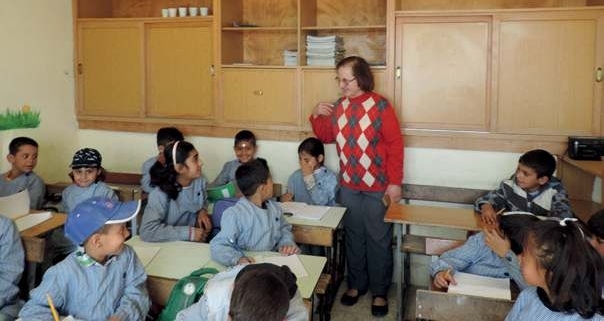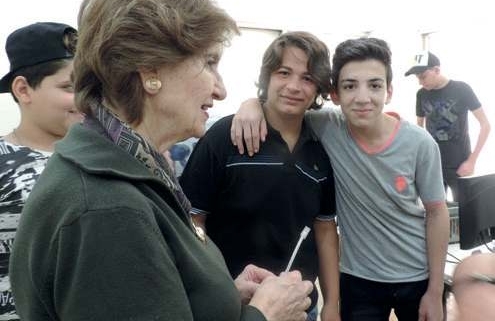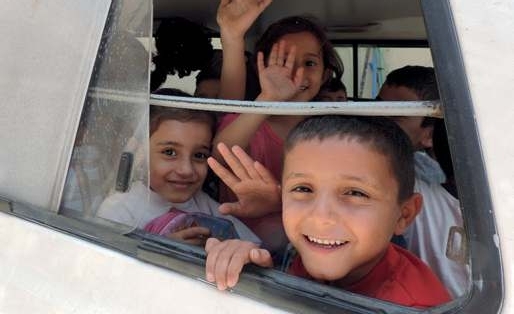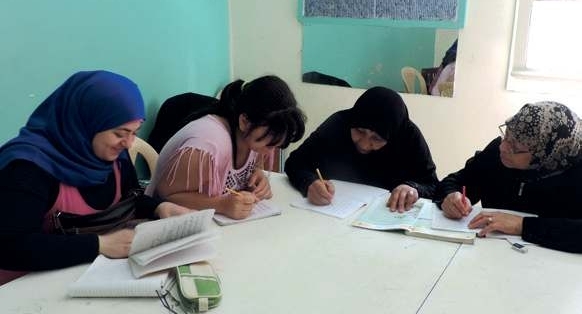When I needed a neighbour…
Maureen Jack highlights the response of churches in Lebanon to the Syrian refugee crisis.
FEATURE
IMAGINE what it would be like if, within the space of a few years, one and a half million people arrived in Scotland seeking refuge. That is what has happened in Lebanon: that number of Syrian refugees has arrived in a country not much bigger than our Highland Region and with a local population smaller than ours.
There are some in Lebanon who are unhappy at the loss of low-paid jobs and cheap housing to the refugees. Add into the mix the fact that it’s not many years since Syria and Lebanon were in conflict. Add in too the fact that virtually all of the Syrian refugees are Muslim, while roughly a third of the Lebanese people are Christian. Despite this, the churches in Lebanon are responding magnificently.
In April/May, after participating in an Embrace the Middle East supporters’ tour to Lebanon, I stayed on to see some of the work of Church of Scotland partners, the National Evangelical Synod of Syria and Lebanon (NESSL) and the Joint Christian Committee (JCC); I spent a day each with Mary Mikhael of NESSL and Sylvia Haddad of JCC.
Most refugees arrive with very little, perhaps fleeing from a family home destroyed in the fighting. Those who can afford to do so may rent a cheap apartment in Beirut, and crowd in as many people as they can. But I saw others living in informal tented settlements in the Beka’a valley near the Syrian border. A first essential is food, and churches have throughout provided regular food parcels to those in need. Many Church of Scotland members have given generously to the Place At The Table appeal, which has supported NESSL’s work in this area; for further details, please see www.churchofscotland.org.uk/serve/world_mission/get_involved/place_at_the_table. I was struck by the fact that a congregation I visited makes a point of distributing food from a separate building, so that the mainly Muslim beneficiaries do not feel any obligation to come to church.
But come they do. At morning worship in Beirut I saw several Muslim women wearing hijab sitting in the congregation. And a pastor told me that some of the Syrian Muslims living outside his town are keen to discuss Christianity with church members, intrigued to learn about the faith that inspires them to help the stranger in their midst.
The churches have now moved beyond simply offering immediate humanitarian relief. Unlike in Syria, where education is free, most schools in Lebanon are fee paying, with only the poorest children attending government schools: places are very limited and refugees who have tried to enrol their children have been unsuccessful. Churches are among those stepping in to fill this gap. I visited two education centres run by NESSL in the Beka’a for Syrian refugee children: one in a Baptist church building (run jointly by NESSL and Baptist congregations) and one in a disused NESSL school. There were children of eight years and older for whom this was their first experience of school. I can only imagine what some of these children will have been through, but without exception they seemed happy, confident and keen to learn. The young women teaching them clearly make learning fun: and who wouldn’t enjoy showing off their newly-acquired language skills with a boisterous ‘Head, shoulders, knees and toes’!
The settlement where some of these children live consists of makeshift tents on concrete bases. Hygiene facilities are very limited, and there is little protection from the heat of the sun or the ravages of winter. So the classrooms offer respite from a difficult present as well as hope for a better future for the children.
JCC is part of the Middle East Council of Churches’ Department of Services for Palestinian Refugees; until the recent arrivals from Syria its work has been with Palestinian families who sought refuge in Lebanon in the late 1940s from the violence in their home country around the time of the creation of the State of Israel. I visited the JCC centre in Sabra camp with Sylvia. It was a hive of activity: classes of young children following a primary school curriculum; an electronics class being taught by a young Syrian; and a literacy class for women, young and old.
Dbayeh camp on the edge of Beirut was established in 1956, principally for Palestinian Christian refugees from the Galilee; its residents are still mostly Christian, and the Church of Scotland is currently making a small grant towards JCC’s work in the camp. JCC works with the Palestinian refugees, but now also provides education for the young children from the 90 Syrian Muslim families who have recently come to live in the camp; and when I visited with Sylvia there was also a recently arrived Iraqi boy in one of the classes.
Some refugees will remain in Lebanon, but some of them will return to Syria; indeed, some are already doing so as certain areas become safer. I was interested to hear from Sylvia that JCC is taking some older pupils to Damascus to sit their final examinations, so that they have the qualifications that they would need in Syria in the future. Already, 600 students have done this; several have then chosen to remain in their home country, some of them motivated simply by homesickness, but others by a desire to contribute to their nation’s rebuilding.
Mary Mikhael and Sylvia Haddad are both Presbyterian. They have both been international delegates at our General Assembly, Mary in 2013 and Sylvia in 2017. They made a big impression on those of us who met them in Edinburgh, and it was a delight to see the respect and affection in which they are held in their own community. Their commitment to their work, at an age when they might reasonably contemplate retirement, is inspiring. And their organisations are doing remarkable work. JCC and NESSL are both small: NESSL has only 23 churches in Lebanon, but nonetheless has established five education centres for refugees.
Wherever I went I saw transformation. The work of our partners and the small grants that World Mission is able to send on behalf of us all being used to serve the least and the lost and the last. Syrian refugees receiving food. Syrian children who had been traumatised by what they had seen and experienced now learning and singing happily. Lebanese Christians who had feared and distrusted Syrians and Muslims now reaching out to serve them. Muslim Syrians intrigued by the faith that leads Christians in Lebanon to help them. And churches energised and reinvigorated as congregations work together to meet the challenge.
As I write this I’m reminded of Sydney Carter’s hymn:
When I needed a neighbour, were you there, were you there?
When I needed a neighbour, were you there? And the creed and the colour and the name won’t matter, were you there?
It’s good to know that, through our Church of Scotland partners, we are able, in some small way, to be there too.
Maureen Jack is Vice Convener of the World Mission Council and Convener of the Middle East Committee. She is an Elder in St Leonard’s Parish Church, St Andrews.

Mary Mikhael with class of Syrian refugees in education centre run by NESSL in Beka’a valley

Sylvia Haddad with members of electronics class at JCC centre in Sabra camp

Syrian refugee children going home at end of school day in Dbayeh camp

Literacy class at JCC centre in Sabra camp